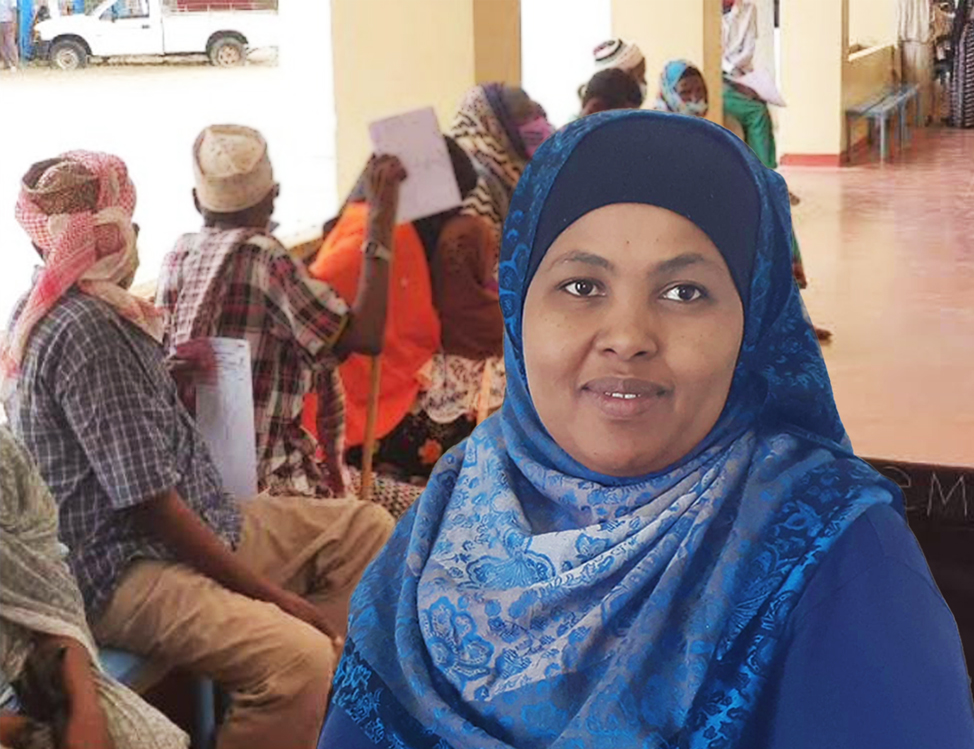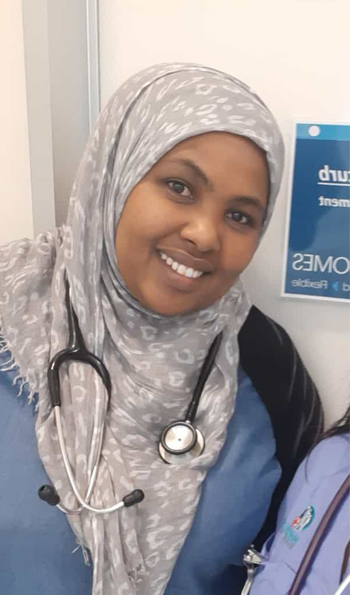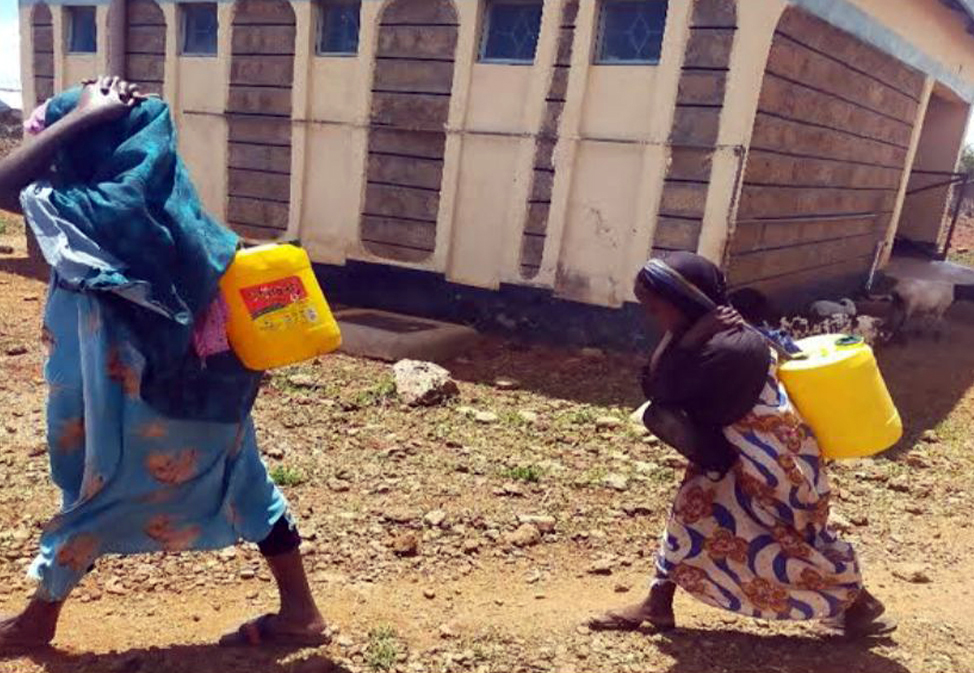30 April 2022

Muslima Halkano Huka
Refugee Health Nurse at Survivors of Torture and Trauma Assistance and Rehabilitation Service
Founder of Health Care Connect
Bachelor of Nursing
A migrant, a mother of two, a practicing nurse, a volunteer, and the founder of a telehealth care service that gives back to her community: this is Muslima Halkano.
A Kenyan-born, UniSA Alum, Muslima moved to Australia from her hometown of Kinna in 2011 to study a Bachelor of Nursing. She is the first generation in her family to graduate from secondary school and go on to university.
“It was an incredible experience coming from a different country with a different culture. It was a learning process, sometimes it was just an emotional roller-coaster because you are a little bit far from everyone you know,” says Muslima.
“But you learn, and you cope, and you get the best thing out of that: your education at the end of it.”
Muslima started practicing as a registered nurse in 2014 and quickly discovered an interest in chronic disease management. Having worked in mainstream practices, and then with Indigenous communities, Muslima has now found her niche, working with refugees and new arrivals.

Classified as a refugee health nurse, Muslima works with Survivors of Torture and Trauma Assistance and Rehabilitation Service (STTARS), a not-for-profit organisation that provides services to address a range of physical, psychological and social needs for survivors of torture and trauma.
“I work in the nursing program. It’s a little bit different from traditional nursing because we do home visits for new arrivals and refugees to do comprehensive health assessments, and identify any unmet health needs,” says Muslima.
“For example, we identify the health needs of the clients, and we go with this person to their doctor’s appointment, to their GP, or specialist, or hospital, and advocate for them around the issues that need to be treated.
“We advocate for them, but we also empower them by showing them examples about how they can advocate for themselves.”
Muslima also ensures that the refugees and new arrivals fully understand their diagnoses and how to manage the conditions. Often, with language barriers or different levels of health literacy, information is not clearly communicated to clients.
“We help them navigate the health system because it’s very new to them. Many of them have not experienced a structured health system like we have in Australia and do not understand the difference between physiotherapist, doctor, or a podiatrist. They see everyone as a doctor, so we make sure they understand the role of those people. It empowers them.”
This is Muslima’s paid job, and only one aspect of her very busy life.
She is also a South Australian Fellow with Results Australia, part of a global movement empowering everyday people to advocate for a world without poverty.
“It’s a volunteering role and I am coordinating a team of advocates to influence the Australian Government to support poor, low-income countries to fight tuberculosis (TB), malaria and HIV,” says Muslima.
“As we saw with COVID, disease knows no borders. Prior to COVID, TB was one of the most infectious diseases globally, and unfortunately there is still TB, along with malaria and HIV in countries in our region.”
Muslima’s efforts do not stop there. She has drawn on the knowledge acquired during her studies and career, taken the lessons she has learnt as a volunteer, and leveraged off her own lived experience to embark on her biggest project yet: Health Care Connect, a telehealth care service for the people in her hometown of Kinna in Kenya.
“Kinna is a small remote rural town, where I was born and raised,” says Muslima.
“They don’t have a well-structured health facility. They have a dispensary and small health facilities where if you have a cut or a graze you can get a bandage, but that’s it.
“Kinna is eight hours drive from Nairobi, the capital of Kenya – so a long way from expert support.”
The last time Muslima visited Kinna in 2019, she noticed that there is an increased risk of chronic illness within the community, yet no facilities to help combat the health crisis.
“What really triggered me to take action was a child I came across who has diabetes. She was eight back then. Type 1 diabetic. Her parents did not know what diabetes was, or how complex the condition is, and there was no health support around the child,” says Muslima.
“I realised I needed to do something about it. So that is where the idea of Health Care Connect came from.

“Sometimes bad things happen, and good things come out of it, so with COVID I understood that there was something called Telemedicine or virtual clinics. So that is the step I took.”
Health Care Connect is not designed to be a clinic that provides physical assessment or clinical assessment, but it is used to help share knowledge to the people of the community, and to educate people on their conditions and treatment options and to point them in the right direction.
“I shared the idea with my colleagues, and they agreed to support it and volunteer their time,” says Muslima.
The clinic is now up and running with four volunteers alongside Muslima in Australia, and an office managed by admin personnel in Kinna.
“We meet on Zoom and we do a bit of a health assessment with the patient and from there we provide advice and advocacy as much as we can,” says Muslima.
“The other day, I had a gentleman come in and his blood pressure was very high. He was on medication, but he hadn’t taken his medication for the last three days because he was fasting for Ramadan. I told him he needed to take his tablets and go to the dispensary to check his blood pressure again that night. I told him that if the pressure was still high, he may need to travel to access proper services in order to bring down his blood pressure.
“It’s not much, but we hope it makes a difference.”
Out of the population of 13,000 people in Kinna, Muslima does not know how many people are living with chronic illnesses, but demand is rapidly growing as word gets around about Health Care Connect.
“We know that the conditions are life threatening, but there is no support, so if they access the support we provide it may give them hope that someone is listening to them.
“It sounds very simple but, at the moment, that is my goal. To empower them.
“You never know, in the future it might get to the level where we can provide things like insulin pumps, but we are not at that stage at the moment.”
UniSA has a pool of health professionals in its student body and alumni contacts. If you are one of them and interested in donating your time, or offering support in any way, to Muslima and Health Care Connect, please contact Muslima at muslimahalkano203@gmail.com and help expand the reach of this important health service.
“It’s not all about us, right? We can do the little things that can maybe change someone else’s life, and, in this case, I think that is it,” says Muslima.


